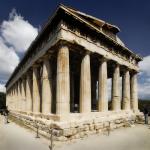|
This section contains 282 words (approx. 1 page at 300 words per page) |

|
The greatest contribution of the Athenians may have been dramatic poetry, an invention credited to a man known as Thespis, the first tragic actor, whose name still survives in one of the modern terms for actor, thespian. Around 535 B.C.E., the tyrant Pisistratus instituted a new festival in honor of the god Dionysus, called the City Dionysia. Once a year, in early spring, Athenian citizens, probably only men, gathered to watch a trilogy of tragic plays followed by a comic play on each of three successive days. The festival was actually a competition in which leading poets, like Aeschylus, Sophocles, and Euripides, the three best-known' tragedians, competed to win first prize. There were also processions, sacrifices and libations, a parade of war orphans, comedy performances, and various types of poetry. The spectators began watching the plays at dawn and stayed...
|
This section contains 282 words (approx. 1 page at 300 words per page) |

|




